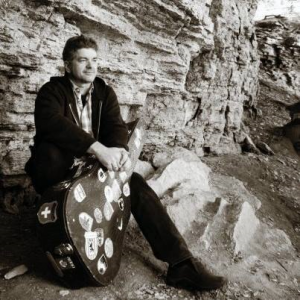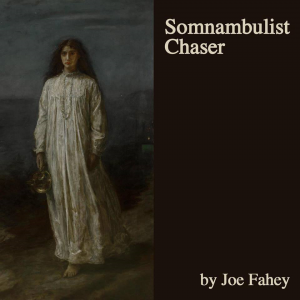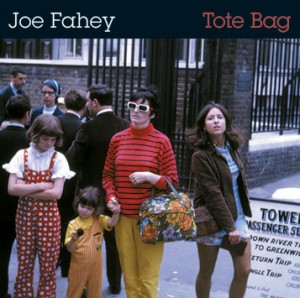 Local music vet, Joe Fahey is a cross between John Prine and the (lucky if you have him) brother-in-law whose sense of humor makes Thanksgiving bearable. On “Mark of the Wolf,” a rocker on Fahey’s new album Bushnell’s Turtle, Joe describes the downsides of being a werewolf: “Ever since I was in Webelos, I’ve said my prayers at night/now I’m a part-time animal whose loafers don’t fit right/and I’m always running, no more moonlight serenades/from all those village idiots and their torchlight parades.”
Local music vet, Joe Fahey is a cross between John Prine and the (lucky if you have him) brother-in-law whose sense of humor makes Thanksgiving bearable. On “Mark of the Wolf,” a rocker on Fahey’s new album Bushnell’s Turtle, Joe describes the downsides of being a werewolf: “Ever since I was in Webelos, I’ve said my prayers at night/now I’m a part-time animal whose loafers don’t fit right/and I’m always running, no more moonlight serenades/from all those village idiots and their torchlight parades.”
When’s the last time you heard the word Webelos? “I love romance,” Joe sang with his ‘90’s rock/country band Carp 18, “especially with no pants.”
Besides funny, rock and country tunes, Fahey (again like Prine) writes tender, without being weepy, lived-in ballads. “Joe’s funny songs,” says Belfast Cowboys front man, Terry Walsh, “make his poignant songs more poignant, and his poignant songs make his funny songs funnier.” On “Are There Clouds,” Bushnell Turtle’s stand-out ballad, Joe sings: “Like bumper cars on the boulevard each crash is so benign/like a pinball against a bumper I’m tiltin’ all the time.”
Fahey also tells good stories. To hear a few I invited him over, gave him a Summit and played a handful of his own songs for him.
1. “Unlisted Number” Carp 18 Russian Racehorse 1996 Rough Fish Records.
Joe Fahey: “This song is partially about this guy called Bullet who put a bathroom in the basement of my parent’s house. He was a character. He’d been captured in World War II and had ended up in a German POW camp. He’d been shot and the bullet had never been removed from his head. It was still in there somewhere. Bullet was the world’s worse contactor, but he had stories. He’d tell about his girlfriend throwing frying pans at his head and about the strange jobs he picked-up like driving prisoners’ wives over to Stillwater for visiting day. He also had this big car that always left oil stains in our driveway.”
Craig Planting: “You’ve mentioned this was recorded live at Stand Up Frank’s. How did you end up playing a gig there in the morning?”
JF: “Russian Racehorse was done and I wanted to record one more, weird live track somewhere. Our rehearsal space was next to Stand Up Frank’s in North Minneapolis and we used to hang-out there. It was a wild place.”
CP: “It was famous for the potency of its mixed drinks.”
JF: “Right, so I wanted to go in and record with all those crazy people in there, but I couldn’t find them in the phonebook, this was pre-internet. Finally I stopped in and told the bartender I’d been trying to find their number and he laughed and said: ‘Yeah, we keep it unlisted.’ The guys along the bar all laughed and then I got it. No one could get a hold of these guys when they were drinking in Stand Up Frank’s. It was their getaway. I went home and wrote this song in about ten minutes.”
CP: “And the gig?”
JF: “When I asked the bartender about playing, he said: ‘well, maybe…’ They didn’t have live music and I don’t think he wanted us messing with their crowd. Then I was almost afraid to follow up so I asked Dave (Carp 18 bassist Dave Helgerson) to set it up. He called me back and said: ‘Yeah, we’ve got Wednesday, May 18th from nine until noon.’ And I said: ‘uh, what?’ But our producer, Tom Herbers, said he’d come along and record us and it turned out to be a beautiful day. They had the doors open and we could hear big, industrial trucks pulling up to stop signs (imitates screeching air-brakes). At first there were only a couple guys drinking in there, but then the room filled up. It all developed before our eyes. Someone’s dog was walking around inside the bar. It was that kind of a day. By the end guys were hugging us and we were all best friends. The guys in there hit it off with Tom.
CP: “You’ve always worked with Tom Herbers. What does he bring to your music?”
JF: “Carp 18 would literally play gigs for a year to save up money to record with Tom. It was a game we played with ourselves. We’d make twenty bucks playing the 7th St. Entry and we’d throw it in the pot. We’d have spent a hundred on beer, but pretend that didn’t happen. Then at the end of the year we’d have 600 bucks and we’d call Tom and spend the day in the studio with him and come out with two or three killer recordings. Tom’s ears are amazing. I just trust him. He’s a fan of all of this cool music like Big Star and Velvet Underground, yet he’s also a closet Cheap Trick fanatic. He told me once he’s seen them over sixty times.”
CP: “He’s really seen Cheap Trick that many times?”
JF: “Yeah, when you’re a certain age and a group comes along, then that’s your group for life. That’s Cheap Trick for Tom. I played Cheap Trick covers in some of my early bands and after all this time I do respect them.”
CP: “And they’re still out there plugging away.”
JF: “Yeah, they’ve just never quit.”
2. “Weeping Willow” Carp 18 Bug Rump 2006 Rough Fish Records.
JF: “I wrote this for my sons and I cried when I wrote it. I was out in my garage, smoking cigarettes next to my tool box. I got one line out and I cried and I thought: well, this has to be good, right? Then I rewrote and rewrote and rewrote it. I’ve never worked on a song as hard as this one. Whatever words I came up with just weren’t powerful enough to describe my love for my sons. And I didn’t want to write anything clichéd, but I suppose the message is kind of a cliché: don’t be in a hurry to grow up and when you do grow-up, don’t grow-up all the way. Remember the moments that are mysterious and magical. I sang it for the record and have hardly played it since.”
CP: “You’ve also mentioned that your songwriting took off after you formed Carp 18.”
JF: “Yeah, because of country music and Dave Helgerson. He was one of the first guys I met who I could sit around and drink beer and talk music. Dave was, like me, a Neil Young fan and we both loved the Replacements and the Stones, especially “Far Away Eyes.” I didn’t really think about songs as songs until I met Dave.”
CP: “How did you think of them?”
JF: “As filler and backgrounds for guitar solos, as vehicles for setting up jams. I can’t believe how long it took me to figure this out, but I’d been playing forever and I wanted to be a virtuoso like Jeff Beck where you play in a cool little combo with a singer. It was the era of guys like Al Di Meola and Jeff Beck and Jimmy Page. Jimmy Page was a wizard. Anyway, I’d go to jams and guys would be playing their stuff and things like Van Halen’s “Eruption” and I just knew I couldn’t do it. I knew I’d never be able to play “Eruption.”
CP: “So what did you learn from Dave?”
JF: “That the song is everything. All the production and everything around it is just fashion. A song can be timeless. I learned this from playing acoustic guitars with Dave who was a very quiet, primitive guitarist. He grew up on country music. His dad played guitar and brought him to see Johnny Cash and George Jones and all the great country legends while he was growing-up.”
3. “Muscle Car Blues (Tell Me Another)” Carp 18 Bug Rump 2006 Rough Fish Records.
CP: “What’s the deal with all the muscle cars in your songs?”
JF: “When I was a kid in the mid-Seventies your identity, especially in small towns, was defined by the car you drove. There was a guy at school that had a great Mustang, but it was a six-cylinder, so he wasn’t that cool, right? Of course, I drove my parent’s light blue station wagon whose horn went beep, beep, beep, so I usually didn’t drive anywhere. I rode in other people’s cool cars and tried to take on their cool mystiques.”
CP: “That era had great cars.”
JF: “One friend of mine had this Pontiac which looked pretty nondescript, but had one of the most powerful engines ever made. When he gunned it you actually felt your cheeks go back. We’d take our cars to this big hill, Deer’s Pass. You’d flip your air-cleaner top over and head down this hill and my friend got his Pontiac up to a hundred and twenty. He hit the brakes and nothing happened, so it became a real, real quiet ride. Everyone just stared straight ahead. At the bottom of the hill my friend hit the T-intersection and had no choice but to plow nose-first into the ditch. Everyone hit their heads, but survived. Then a neighbor guy ran out of his house and yelled: ‘Hey! You can’t park there!’”
4. “Porta One” Joe Fahey Tote Bag 2006 Rough Fish Records.
CP: “Who is Porta One?”
JF: “Porta One is my four-track tape deck. Carp 18 had broken-up and I felt defeated sitting there with my little tape deck by myself. I felt like I was starting over from square one. I wrote about fifty songs and I couldn’t imagine going into the studio without a band, but Tom encouraged me. He liked the songs and said that without a band we’d have the freedom to make a really weird, cool record.”
CP: “Tote Bag is so sparse and psychedelic; one reviewer said it ‘ranged from trippy to mournful.’ Were you trying to get away from Carp 18’s country/garage rock?”
JF: “I was trying to get away from everything.”
CP: “I love this album; it’s so sad and cathartic.”
JF: “Thank you, I’ve been so surprised by the response. The range of people who have talked to me about it is amazing. I’m thrilled that people have connected with it.”
5. “Camel Watusi” Joe Fahey Bushnell’s Turtle 2011 Rough Fish Records.
CP: “This has to be your wildest song.”
JF: “This is one of the first songs I ever wrote on electric guitar. It was influenced by the B-52’s. The first band I was in, Rendezvous, used to play it with really long guitar solos.”
CP: “Do you remember Rendezvous’ first gig?”
JF: “It was in The Joint, next to the Cabooze, and it was terrifying. Originally we were a pop/rock trio, but we’d just added these two women who sang and played guitar. They were into Crystal Gayle, Linda Ronstadt and whatever Eddie Rabbit’s latest hit was. They were like little birds singing harmony and they were beautiful. The rest of us didn’t really know how to play. I’d play my bass full-blast, just really distorted and I’d make it up as I went. Our guitar player didn’t know the names of any chords and we had a hippie drummer who thought Janis Joplin was still alive somewhere. Our music was this big, psychedelic, distorted mess, but we liked it that way. We’d play “Magical Mystery Tour” for twenty minutes and it was better than climbing the rope in gym class.”
CP: “What year was the gig?”
JF: “It was 1980 and The Joint was a pretty rough biker bar. At the end of the bar there was a ladder that went up to the stage which was about (holds out arms) this deep. We had a drum set and five people up there. I was afraid I was going to fall right onto the bar. The bikers were yelling at us and saying things to the women. It was intimidating. We had one original song where the women sang acappella (scat sings in a high pitch) and then-BAM!-when we all came in someone hit the wrong chord. It was such an enormous, awful clam that we all stopped. I wanted to try again, but the women didn’t want to sing it again and kept saying: ‘No, Jumping Jack Flash! Jumping Jack Flash!’ But I said: ‘No, we can do it. It’s a G-chord.’ So we try again and-BAM!-another clunker. Now the bikers are laughing and we’re all terrified, but, again, I whisper: ‘Just one more time.’ So, we try once more and blow it again and a guy at the bar yells: ‘Three Strikes and You’re Out!’ The bikers laughed their asses off and the next thing you know we were playing “Jumping Jack Flash”.”
6. “Resolution” Joe Fahey Bushnell’s Turtle 2011 Rough Fish Records.
JF: “This song was inspired by a near-death experience. I have an allergy to Yellow Dye #5 which is a food coloring they put into Mountain Dew and circus peanuts. On Y2K I put on a Hawaiian lei that must have had Yellow Dye #5 and I had the worst allergic reaction of my life. It was a horrible, excruciating experience. My esophagus swelled up and I couldn’t breathe. My feet felt like they were on fire. I ended up riding it out alone like the werewolf who locks himself away in his room and then found out later that I could have died. I wrote this song the next day. The words have developed over the years and I’m happy with them. A lot of my songs are really positive now instead of being centered on dark humor and self-deprecation. This one puts me in a good mood.”
CP: “So what’s your resolution?”
JF: “To create music that lifts people, even if it’s for two seconds. I want to write songs that take you away for a moment and that convey an appreciation for life and the fact that we’re surrounded by people who can play tricks with your mind to make you feel better. And I want to keep putting out albums. I feel like I finally know what I’m doing. I’m kind of like Cheap Trick. I’ve just never quit.”
CP: “Last question: who or what is Bushnell’s Turtle?”
JF: “Bushnell’s Turtle was one of the first submarines and it was in the Revolutionary War. It was built by a dentist who was a patriot and he was going to use it to blow up a British ship. It was maneuvered by turning hand cranks and it must have been scary to pilot. It would have been dark and you’re floating along in this little wooden ball. I was fascinated with this story as a kid and I just loved the idea of this guy doing this, but when I came up with it as an album title I was thinking about the monstrous devices we’ve now created to kill people.”
CP: “Was Bushnell able to blow up the British ship?”
JF: “No, because he got up to it and it had a steel hull. He was going to screw into the hull and somehow place the bomb and then paddle like crazy back to the dock. I have no idea how he was going to detonate the bomb. The story to me represents the follies of war.”
(Author’s notes 2014: Joe Fahey’s new album Somnambulist Chaser will be released this fall.)
Links to Joe Fahey:
http://www.joefaheymusic.com
https://www.facebook.com/joefaheymusic
https://twitter.com/joefaheymusic
http://www.reverbnation.com/joefahey


